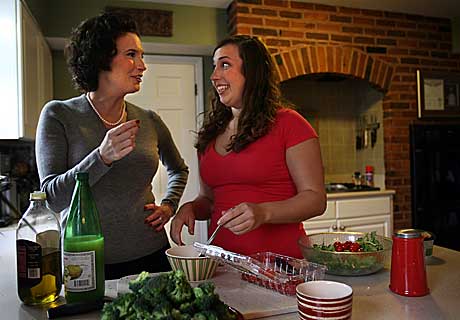(Republished with permission from the St. Louis Post-Dispatch. This article originally ran in the Health & Fitness section on Thursday, April 16, 2009)

By Cynthia Billhartz Gregorian St. Louis Post-Dispatch
Three years ago, Kathy Ferrara was faced with the heartbreaking task of telling her children she had cancer.
Six years earlier, their father had died suddenly, and they were still reeling from that. So Ferrara carefully planned her message.
There would be no crying, no hand-wringing, no “what ifs.”
There would be only facts.
“I didn’t want them thinking about worst-case scenarios,” says Ferrara, 44, of Des Peres. “There was no reason for it.”
She set a calm, upbeat tone, and her children, Alexandra, 21, Natalie, 19, and Giovanni, 16, followed suit, she says.
Meanwhile, everyone was torn up inside.
Next week, Ferrara and Natalie will sit in a quiet room at the Siteman Cancer Center at Barnes-Jewish Hospital and talk in-depth about when mom found out she had Stage 2 colon cancer and cellular tests revealed a high risk for recurrence.
The conversation will be recorded by StoryCorps, a nonprofit organization in Brooklyn that’s constructing one of the largest oral history projects of its kind.
The Ferraras will receive a free CD recording of their conversation, and another will be archived at the Library of Congress. Starting Friday, StoryCorps will be recording dozens of cancer survivors, alone and with family and friends, about what it was like to tell their children they had cancer. They’ll tell their stories over three weeks at Siteman centers in St. Louis, West County and St. Peters. Segments of some recordings will air on public radio and the Internet.
StoryCorps records conversations by using soundproof recording studios called Story Booths; by sending MobileBooths, which are Airstream trailers equipped with a recording studio, around the country; and by sending teams of facilitators to organizations, institutions and communities for on-site Door-to-Door Recording Days, such as the sessions at Siteman.
Several months ago, Washington University School of Social Work and the Research Triangle Institute in Washington invited StoryCorps to come record the conversations.
The recordings will help people diagnosed with cancer in the future figure out how to talk about it with their families, says Matt Kreuter, director of the health communications research laboratory at the School of Social Work.
“It’s a difficult conversation to have, and there aren’t a lot of tools or instructions available to help with it,” he says.
Ideally, Kreuter says, he would like to see libraries of the recordings in cancer centers where patients could check them out, and online where they could search for recordings of, say, cancer survivors who had children the same age as theirs.
“Of all the things they have to think about when they’re diagnosed, one is how to talk to their family in a way that’s understandable but not terrifying,” Kreuter says. “And I think these voices of experience will be the best teachers.”
Ferrara remembers going over and over in her head exactly what the doctor told her back in 2006 so she could be specific when explaining it to her daughters and son, she says.
“My first daughter, Alexandra, was on her way to college, and that’s what I wanted her to be thinking about,” Ferrara says. “Even going through the chemotherapy, I kept a lot of it to myself. And I had an amazing support network that I could lean on, so I could be strong for my children.”
Natalie, who was 16 at the time, remembers her mother’s matter-of-fact demeanor. She recalls learning about her mother’s diagnosis and thinking it wasn’t so bad. Later though, when Alexandra cried really hard, Natalie realized the gravity of the situation.
“But I never cried in front of Mom,” she says. “I wanted to stay strong in front of her so she didn’t have the added stress of what we were feeling. So she could focus on herself and getting better.”
More than 35,000 people have shared life stories through StoryCorps since 2003.
StoryCorps provides a space that’s isolated from people’s hectic lives, says Alissa Pelc, manager of business development for StoryCorps.
“It’s 40 minutes of uninterrupted quiet time to just talk face-to-face, and that prompts people to ask things they wouldn’t normally ask, or communicate in ways they normally don’t,” Pelc says. “We think of it as almost a sacred space that elicits these wonderful conversations.”
Kathy and Natalie Ferrara expect to get a deeper understanding of what the other was feeling back then: the fear; the sadness; the uncertainty. Passage of time and Ferrara’s clean bill of health means they don’t have to worry about … well, worrying each other, they say.
“It’s a wonderful way to strengthen our bond and say things we hadn’t thought to say before,” Ferrara says. “It’s over now, and she doesn’t have to be scared anymore, so it’ll be a lot easier for us to revisit how it how it really was for the two of us.”
Copyright 2009 St. Louis Post-Dispatch, Inc.